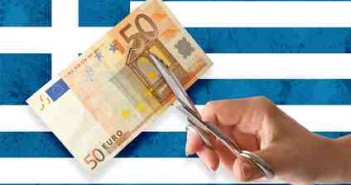Trichet resists any involuntary private sector participation in a Greek bailout? Well, German banks are showing some involuntary signs of volunteering to participate, as pressure for Greek restructuring continues to mount over the weekend, from many directions. This may weigh on the euro at the beginning of the week. Updates.
Early preparations
Merkel began preparing the public for a restructuring of Greek debt already at the end of April. The EU began working on such plans soon after, but the ECB stood on its heels since then, and things got complicated.
But as time is running out, with the Greek central bank beginning to prepare its local banks for such a scenario, and many other worrying signs appearing as Greek is about to run out of money in one month, the crisis accelerated.
Escalation of the crisis
The current round began with the publication of the letter that the German finance minister Wolfgang Schaeuble sent to Trichet, a letter in which he strongly suggested to extend maturing Greek bonds by 7 years. This rift between the European Central Bank and Germany accelerated now.
Over the weekend, also the head of the Eurogroup, also German Chancellor Angela Merkel backed the idea in a message to the German public, warning of the consequences of inaction:
Mrs. Merkel asserted that Germany’s own economic recovery could be endangered. “If we don’t act right, that could happen,†she said in her weekly video podcast, “but that’s exactly what we want to avoid.â€
Luxembourg’s Jean-Claude Junkcer, a powerful leader, backed the German position as well, saying that “There must be a participation of private creditorsâ€, although he did say that this must be voluntary, and with the ECB’s support.
Volunteers Found
German banks hold a lot of Greek bonds. So do Greek banks and pension funds, and so does the ECB. Now, German banks begin understanding that if they don’t volunteer, they will be left with less of their Greek assets, as well as with a messy default that will cost them even more money in the after affects.
The German banking association is now with the government, and listen to this (emphasis mine):
Asked if the banks went along with a resolution by the German parliament urging private creditors to contribute, BdB Managing Director Michael Kemmer told a radio interview: “What Herr Schaeuble has proposed is in principle not unreasonable. Our members would also participate.â€
Well, Mr. Trichet, we have volunteers. Plenty.
Trichet Already Giving Up?
In the press conference on Thursday, following the rate decision, Trichet already showed signs of giving up. He said about a restructuring of Greek debt: “We will say it is an enormous mistakeâ€. This kind of talk shows that he didn’t change his mind, but he understands where the wind is blowing.
Such a Greek restructuring would test the credit agencies. On one hand, this would be “voluntaryâ€. Moody’s said that any mandatory plan would mean a default. On the other hand, it still means that creditors don’t get what they had to get in the bonds, but holders of CDS don’t get paid. So what are Credit Default Swaps good for?
Contagion Effects and EUR/USD
Also in Ireland, there is support for the German restructuring plan. Here’s what an Irish minister said (emphasis mine):
Rabbitte–a former leader of the Labour Party that’s now the junior partner in the new government, said Schaeuble’s letter “may†offer opportunities for Ireland to deal with its own debt crisis
The Irish people would be better off if some of the Irish bank debt would be restructured. This would lower the cost for the Irish taxpayers as well.
The euro already made big falls against the dollar on Thursday and Friday, as the rift in Europe and the reduced chances of a happy end began to weigh on the markets.
Yields on Greek, Portuguese, Irish and also Spanish bonds rose significantly on Friday.
These factors will weigh on the Euro at the beginning of the next week, as time is running out. Important European meetings are scheduled for June 20th and June 24th. The next tranche of aid for Greece is due on June 29th. Greece is expected to run out of money in mid-July.
Further reading:
- Euro to dollar forecast: for the upcoming events in Europe this week and a technical analysis of EUR/USD.
- Spanish Hidden Debt II: About where the bigger problems are cooking.



